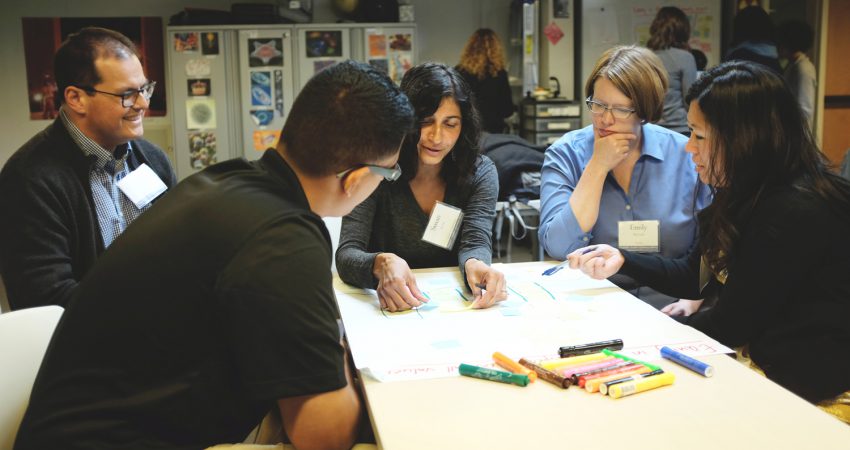
By Bronwyn Bevan - May 2011
PAPER CITATION
Webster-Wright, A. (2009). Reframing professional development through understanding authentic professional learning. Review of Educational Research, 79(2), 702–739.
WHY IT MATTERS TO YOU
The paper is of special interest to ISE educators designing and leading professional development programs for other educators (formal and informal). It describes how particular PD approaches may provide or impede opportunities for critical reflection and ongoing learning.
In a review of the professional development literature, the author of this paper highlights consensus findings about professional development approaches and raises important questions about assumptions underlying the different models. In particular, the researcher contrasts what we know about continuous professional learning – that it happens over time and is contextual – with knowledge delivery training models that dominate most professional development. In an era of reduced resources and increasing accountability, the study calls for careful attention – both at the design and research levels – to how programs can support authentic (transformational) learning while at the same time being accountable.
The paper describes an emerging research consensus that clearly indicates that professional learning occurs over a long period of time and is best supported when situated within a community that supports learning; when it helps people to reflect and challenge assumptions and existing practices; when it connects reflection with action; and when it allows practitioners to address genuine problems in their practice. The study also notes that despite this consensus, didactic delivery models of professional development continue to prevail, reflecting a conceptualization that treats knowledge like a commodity that can be “delivered.” Such an approach may be easier to evaluate (e.g., what was delivered? how was it delivered?) but there is little evidence showing that concepts are incorporated into professional practices beyond the training setting.
The researcher argues for a reconceptualization of PD that commences with changing terminology from Professional Development (PD) to Continuous Professional Learning (CPL) in order to stress the notions of time, context, and transformational learning. She also claims that the construct of CPL can help conceptualize learning and professional development as happening not only over a long period of time but also throughout the professional setting, including both workshops and workplace, and also in settings removed from work. This change puts the professional learner center stage and seeks to understand how different opportunities advance their learning. But, the researcher points out that the experience of CPL is still not well understood, despite decades of research “about learning in situ and knowledge as used in professional practice” (Webster-Wright, 2009, p. 704), and she argues for a need to better understand how professionals continue their learning process throughout their working lives. Conceptualizing professional learning as CPL allows professionals themselves to consider and name the places in which they have learned, rather than starting with preconceived definitions of professional learning environments.
In this paper, the researcher’s analysis of the current PD literature considers research from community and adult education, workplace learning, and professional education (as in university training programs). She perceives that much of the PD literature is anecdotal, involving “a description of the activities rather than empirical research” (p. 710), and with most being evaluative rather than critical. This approach tends to focus on documenting whether the intervention (e.g., workshop) itself was effective rather than on ensuring that the experience fits within and supports ongoing professional learning. In other words, it adopts a delivery paradigm for professional development, a paradigm rarely called into question.
The researcher acknowledges that the delivery model is much easier to research and evaluate. “It is extremely difficult to find words, let alone methods, to describe and research complex experiences in a holistic manner without [dividing holistic experiences into analytical categories]” (p. 714). She also observes that interpretive research approaches such as ethnography or phenomenology may be appropriate models for researching professional learning. She cites Clandinin and Connelly ‘s 1995 metaphor of “professional knowledge landscapes” as a construct that can elucidate the breadth and complexity of teacher’s professional practices as incorporating personal, ethical, intellectual, and social dimensions (p. 715), and Schon’s 1983 seminal Reflective Practitioner that conceptualized professional knowledge as knowledge-in-practice, taking into account artistic, emotional, and intuitive aspects of knowing. She also argues for the need to build on Schon’s work to conceptualize professional knowledge as embodied, encompassing not only what the professional knows and does, but who the professional is.
The challenge to this conceptualization of professional learning, the researcher acknowledges, is that education is increasingly focused on observable and measurable outcomes which may obscure important transformative learning experiences and may value particular technocratic skills over essential professional attributes such as empathy and reflection. This paper does not provide solutions to this challenge but instead argues for the urgency for research that can develop stronger methods of conceptualizing and researching professional development to achieve meaningful learning.
The author’s extensive references list may be of interest to ISE educators wishing to read more. Key references including those cited here include:
Clandinin, D. J., & Connelly, F. M. (Eds.). (1995). Teachers’ professional knowledge landscapes. New York: Teachers College Press.
Darling-Hammond, L. (1997). The right to learn: A blueprint for creating schools that work. San Francisco: Jossey-Bass.
Hawley, W. D., & Valli, L. (1999). The essentials of effective professional development: A new consensus. In L. Darling-Hammond & G. Sykes (Eds.), Teaching as the learning profession: Handbook of policy and practice (pp. 127–150). San Francisco: Jossey-Bass.
Putnam, R., & Borko, H. (2000). What do new views of knowledge and thinking have to say about research on teacher learning? Educational Researcher, 29(1), 4–15.
Schön, D. A. (1983). The reflective practitioner: How professionals think in action. Aldershot, UK: Arena.




